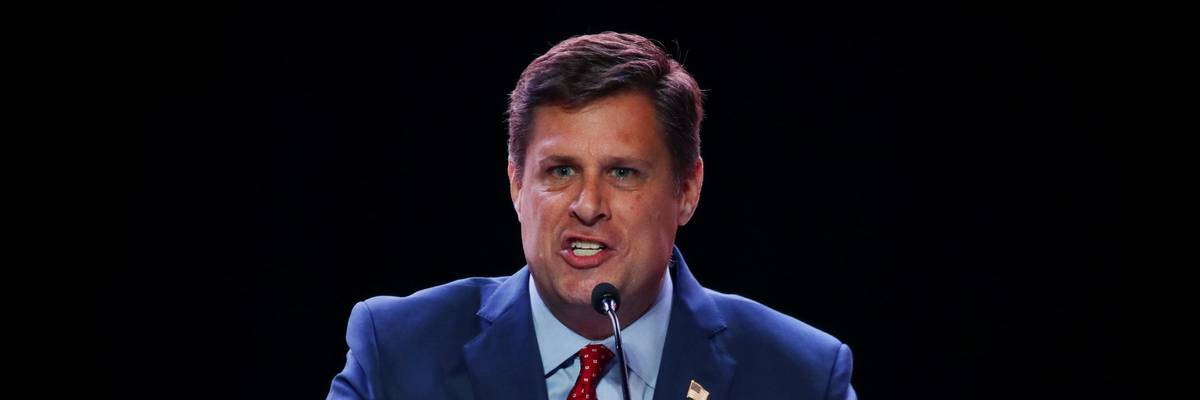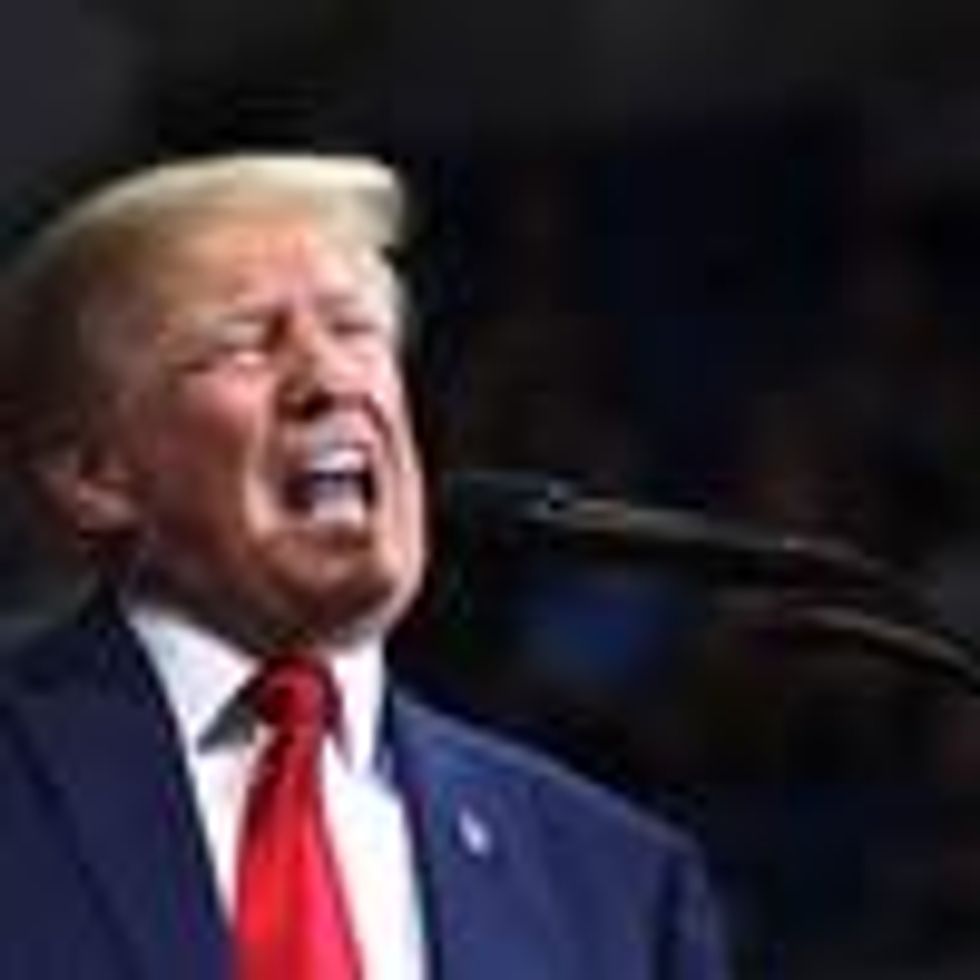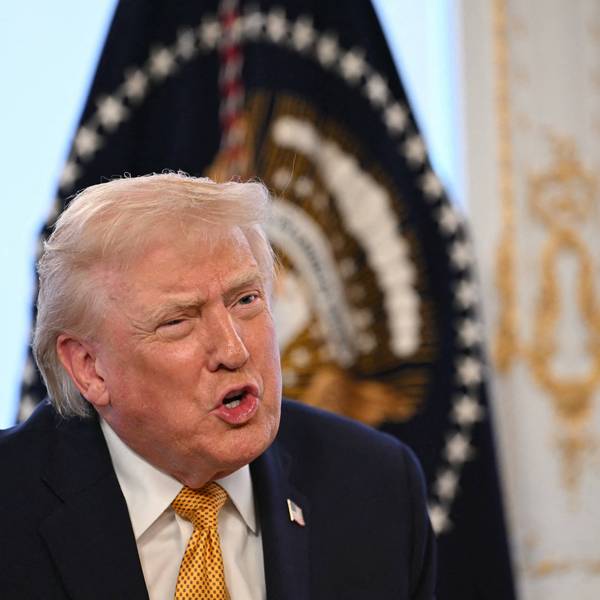
Massachusetts gubernatorial candidate Geoff Diehl speaks during the 2022 Republican State Convention in Springfield, Massachusetts on May 21, 2022. (Photo: Craig F. Walker/The Boston Globe via Getty Images)
Trump Says GOP Gov. Candidate Would Rule Massachusetts 'With an Iron Fist'
The former U.S. president's authoritarian rhetoric generated alarm, with one historian noting that the term "iron fist" was favored by Italian dictator Benito Mussolini and used to describe Germany's Nazi Party.
Former President Donald Trump's use of pro-authoritarian language escalated earlier this week when he celebrated the Republican primary victory of Massachusetts gubernatorial candidate Geoff Diehl--one of many 2020 election deniers on the ballot this fall.
"Geoff is a proven fighter who successfully pushes back on the ultraliberal extremists," Trump said during a Monday night tele-rally. "He'll rule your state with an iron fist, and he'll do what has to be done."
Diehl is not favored to beat Massachusetts Attorney General Maura Healey (D) in the state's gubernatorial race this November, but Trump's embrace of fascist symbolism and reference to doing "what has to be done"--a vague but ominous message that could be interpreted as a threat of violence against political opponents--has raised alarm bells.
As presidential historian Michael Beschloss noted on Twitter, "iron fist" was Italian dictator Benito Mussolini's preferred descriptor of fascism, and the term was also used to describe Germany's Nazi Party, led by genocidal demagogue Adolf Hitler.
Trump's "iron fist" comment came just two days after his Saturday rally, during which he called President Joe Biden an "enemy of the state" and said that the federal criminal investigation into his unauthorized possession of government records would create a "backlash the likes of which nobody has ever seen"--statements that elicited accusations of inciting domestic terrorism.
Related Content

Trump Calls Biden 'Enemy of the State' in 'Fully Unhinged' Speech
At the same rally, Trump characterized Biden's prime-time address to the nation last Thursday--wherein he said that "Donald Trump and the MAGA Republicans represent extremism that threatens the very foundations of our republic"--as the "most vicious, hateful, and divisive speech ever delivered by a president."
One week before his Philadelphia speech, Biden said that the GOP's large pro-Trump faction--encapsulated by the phrase, "Make America Great Again"--was "like semi-fascism."
On the same day as Biden's speech, Trump said that if elected to the White House in 2024, he would "look very, very favorably" at full pardons for the January 6 insurrectionists who assaulted the U.S. Capitol in an attempt to overturn his loss in the 2020 presidential contest.
Right-wingers across the U.S. have responded with fury to Biden's "semi-fascism" comment and ensuing speech only to have Trump repeatedly confirm that he and his supporters are contemptuous of democracy, as some social media users pointed out.
"There is no question that the Republican Party today is dominated, driven, and intimidated by Donald Trump and the MAGA Republicans," Biden said last week, "and that is a threat to this country."
An Urgent Message From Our Co-Founder
Dear Common Dreams reader, The U.S. is on a fast track to authoritarianism like nothing I've ever seen. Meanwhile, corporate news outlets are utterly capitulating to Trump, twisting their coverage to avoid drawing his ire while lining up to stuff cash in his pockets. That's why I believe that Common Dreams is doing the best and most consequential reporting that we've ever done. Our small but mighty team is a progressive reporting powerhouse, covering the news every day that the corporate media never will. Our mission has always been simple: To inform. To inspire. And to ignite change for the common good. Now here's the key piece that I want all our readers to understand: None of this would be possible without your financial support. That's not just some fundraising cliche. It's the absolute and literal truth. We don't accept corporate advertising and never will. We don't have a paywall because we don't think people should be blocked from critical news based on their ability to pay. Everything we do is funded by the donations of readers like you. Will you donate now to help power the nonprofit, independent reporting of Common Dreams? Thank you for being a vital member of our community. Together, we can keep independent journalism alive when it’s needed most. - Craig Brown, Co-founder |
Former President Donald Trump's use of pro-authoritarian language escalated earlier this week when he celebrated the Republican primary victory of Massachusetts gubernatorial candidate Geoff Diehl--one of many 2020 election deniers on the ballot this fall.
"Geoff is a proven fighter who successfully pushes back on the ultraliberal extremists," Trump said during a Monday night tele-rally. "He'll rule your state with an iron fist, and he'll do what has to be done."
Diehl is not favored to beat Massachusetts Attorney General Maura Healey (D) in the state's gubernatorial race this November, but Trump's embrace of fascist symbolism and reference to doing "what has to be done"--a vague but ominous message that could be interpreted as a threat of violence against political opponents--has raised alarm bells.
As presidential historian Michael Beschloss noted on Twitter, "iron fist" was Italian dictator Benito Mussolini's preferred descriptor of fascism, and the term was also used to describe Germany's Nazi Party, led by genocidal demagogue Adolf Hitler.
Trump's "iron fist" comment came just two days after his Saturday rally, during which he called President Joe Biden an "enemy of the state" and said that the federal criminal investigation into his unauthorized possession of government records would create a "backlash the likes of which nobody has ever seen"--statements that elicited accusations of inciting domestic terrorism.
Related Content

Trump Calls Biden 'Enemy of the State' in 'Fully Unhinged' Speech
At the same rally, Trump characterized Biden's prime-time address to the nation last Thursday--wherein he said that "Donald Trump and the MAGA Republicans represent extremism that threatens the very foundations of our republic"--as the "most vicious, hateful, and divisive speech ever delivered by a president."
One week before his Philadelphia speech, Biden said that the GOP's large pro-Trump faction--encapsulated by the phrase, "Make America Great Again"--was "like semi-fascism."
On the same day as Biden's speech, Trump said that if elected to the White House in 2024, he would "look very, very favorably" at full pardons for the January 6 insurrectionists who assaulted the U.S. Capitol in an attempt to overturn his loss in the 2020 presidential contest.
Right-wingers across the U.S. have responded with fury to Biden's "semi-fascism" comment and ensuing speech only to have Trump repeatedly confirm that he and his supporters are contemptuous of democracy, as some social media users pointed out.
"There is no question that the Republican Party today is dominated, driven, and intimidated by Donald Trump and the MAGA Republicans," Biden said last week, "and that is a threat to this country."
Former President Donald Trump's use of pro-authoritarian language escalated earlier this week when he celebrated the Republican primary victory of Massachusetts gubernatorial candidate Geoff Diehl--one of many 2020 election deniers on the ballot this fall.
"Geoff is a proven fighter who successfully pushes back on the ultraliberal extremists," Trump said during a Monday night tele-rally. "He'll rule your state with an iron fist, and he'll do what has to be done."
Diehl is not favored to beat Massachusetts Attorney General Maura Healey (D) in the state's gubernatorial race this November, but Trump's embrace of fascist symbolism and reference to doing "what has to be done"--a vague but ominous message that could be interpreted as a threat of violence against political opponents--has raised alarm bells.
As presidential historian Michael Beschloss noted on Twitter, "iron fist" was Italian dictator Benito Mussolini's preferred descriptor of fascism, and the term was also used to describe Germany's Nazi Party, led by genocidal demagogue Adolf Hitler.
Trump's "iron fist" comment came just two days after his Saturday rally, during which he called President Joe Biden an "enemy of the state" and said that the federal criminal investigation into his unauthorized possession of government records would create a "backlash the likes of which nobody has ever seen"--statements that elicited accusations of inciting domestic terrorism.
Related Content

Trump Calls Biden 'Enemy of the State' in 'Fully Unhinged' Speech
At the same rally, Trump characterized Biden's prime-time address to the nation last Thursday--wherein he said that "Donald Trump and the MAGA Republicans represent extremism that threatens the very foundations of our republic"--as the "most vicious, hateful, and divisive speech ever delivered by a president."
One week before his Philadelphia speech, Biden said that the GOP's large pro-Trump faction--encapsulated by the phrase, "Make America Great Again"--was "like semi-fascism."
On the same day as Biden's speech, Trump said that if elected to the White House in 2024, he would "look very, very favorably" at full pardons for the January 6 insurrectionists who assaulted the U.S. Capitol in an attempt to overturn his loss in the 2020 presidential contest.
Right-wingers across the U.S. have responded with fury to Biden's "semi-fascism" comment and ensuing speech only to have Trump repeatedly confirm that he and his supporters are contemptuous of democracy, as some social media users pointed out.
"There is no question that the Republican Party today is dominated, driven, and intimidated by Donald Trump and the MAGA Republicans," Biden said last week, "and that is a threat to this country."

